What Topics Are Covered in Algebra 1?
Welcome aboard our mathematical journey! Ever wondered, "What topics are covered in Algebra 1?" Buckle up, because we are about to dive deep into the ocean of Algebra 1, revealing its mysterious layers one by one. Let's make this journey as exciting as discovering a new planet!
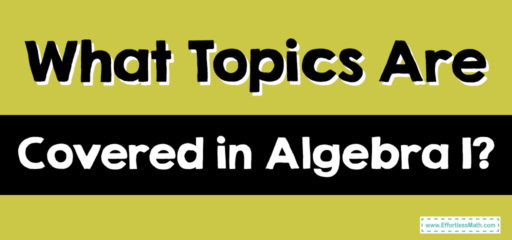
Real Numbers
Let’s start from the basics. You may think numbers are straightforward, right? Well, in the vast universe of Algebra 1, we refer to these as Real Numbers. They include both rational (like 2, \(\frac{1}{2}\), 0) and irrational numbers (like \(\sqrt{2}, π\)).
The Absolute Best Book to Ace Algebra I
Operations with Real Numbers
Just like how the earth revolves around the sun, the operations with real numbers revolve around addition, subtraction, multiplication, and division. They also involve more advanced concepts such as absolute values and square roots.
Algebraic Expressions
Now, moving on to more adventurous territories! Algebraic Expressions. They are the combinations of numbers and variables using mathematical operations, just like a secret code waiting to be deciphered!
Simplifying Algebraic Expressions
To crack the code, we simplify these expressions by combining like terms and applying the distributive property, kind of like simplifying a complex puzzle piece by piece.
Linear Equations
After cracking the code of expressions, we come across Linear Equations. They are simple equations that represent straight lines on a graph. They help us locate points in space, like a GPS!
Quadratic Equations
Then we encounter more complex structures called Quadratic Equations. They form parabolic graphs and play a significant role in many areas of science and engineering, akin to the integral role DNA plays in life.
Best Algebra Prep Resource
Inequalities
Moving further, we come across road signs in our journey named Inequalities. These are just like equations but, instead of an equal sign, we have inequality signs.
Solving Inequalities
Just like solving puzzles, we solve inequalities to find a range of possible solutions. It’s like exploring multiple routes to reach a destination.
Functions
Next stop on our journey: Functions. They are special relationships between values: each input has a single output. It’s like having a unique key for a particular lock.
Types of Functions
There are various types of functions like linear, quadratic, and exponential, each with a unique graph, just as there are different species in a forest, each with unique characteristics.
Graphs
Graphing Linear Equations
The art of graphing starts with Linear Equations. They form straight lines on a graph, creating the simplest of designs in our mathematical universe.
Graphing Quadratic Functions
The beauty extends to Quadratic Functions, creating parabolas on a graph, like unique patterns in nature.
A Perfect Practice Workbook for Algebra I
Polynomials
Venturing ahead, we encounter Polynomials. They are algebraic expressions with several terms, forming the building blocks of many Algebra 1 concepts.
Operations with Polynomials
Performing operations with polynomials is like constructing complex structures with these building blocks, forming the basis for understanding higher mathematical concepts.
Factoring
Another essential stop on this journey is Factoring. It involves breaking down complex expressions into simpler multipliers, just like dismantling a Lego structure into smaller pieces.
Factoring Techniques
Different techniques like factoring by grouping or using special formulas are used, just as different strategies are used in a game of chess.
Radicals and Rational Expressions
As we approach the end of our journey, we come across Radicals and Rational Expressions. They are expressions involving roots and fractions, adding more variety to our mathematical palette.
Simplifying Radicals
Simplifying radicals is like distilling the essence from a complex mixture, reducing it to its simplest form.
Word Problems
The journey of Algebra 1 wouldn’t be complete without Word Problems. They apply mathematical concepts to real-world situations, like applying survival skills in the wilderness!
Final Words
Hence, our excursion into the mathematical cosmos culminates here! Starting from the bare-bones premise of authentic figures, traversing the intricate rivulets of algebraic assertions, meandering through equations and disparities, seizing the dominions of operations and diagrams, voyaging the provinces of polynomials and factorization, and climaxing in the undulating topography of radicals, rational assertions, and verbal dilemmas, Algebra 1 symbolizes nothing less than a daring odyssey across the multifarious topographies of mathematical theories and doctrines.
Bear in mind, akin to every grand odyssey, the allure of Algebra 1 is found not merely in the terminus but in the expedition itself. It embodies the exhilaration of unearthing novel theories, the gratification of deciphering convoluted dilemmas, and the glee of elucidating mathematical enigmas. Each subject you comprehend marks a milestone passed, each dilemma resolved signifies an obstacle surmounted, and each theorem mastered celebrates an achievement unlocked.
However, keep in mind that the exploration doesn’t cease here. Algebra 1 serves as a stepping stone, a springboard that propels you into the infinite universe of advanced mathematics. It furnishes you with the apparatus, capabilities, and assurance to confront more intricate mathematical predicaments and to probe further into the captivating realm of figures and equations. It sparks the beacon of inquisitiveness and fosters the essence of logical deduction and critical contemplation.
As you set forth on this exhilarating voyage, be sure to relish each instant, treasure each revelation, and never halt your explorations. In the bewitching realm of Algebra 1, every equation tells a tale, every dilemma poses an enigma, and every resolution hides a trove awaiting excavation. After all, isn’t that the very essence that makes a journey genuinely unforgettable? Savor the voyage, embrace the enlightenment, and let the magic of Algebra 1 unfold!
FAQs
- What is the purpose of Algebra 1? Algebra 1 serves as the foundation for high school and college-level math. It introduces students to abstract concepts and mathematical reasoning.
- Who should study Algebra 1? Anyone interested in advancing their mathematical knowledge or pursuing a STEM (Science, Technology, Engineering, and Math) field should study Algebra 1.
- When should students start studying Algebra 1? Typically, students begin studying Algebra 1 in the 8th or 9th grade, but this can vary depending on the curriculum and the student’s prior mathematical knowledge.
- Why are word problems important in Algebra 1? Word problems help apply abstract algebraic concepts to real-world situations, enhancing understanding and practical application of the knowledge.
- Can I self-study Algebra 1? Yes, with the right resources and dedication, one can self-study Algebra 1. However, guidance from a tutor or teacher can be beneficial in understanding complex concepts.
- Q: What is the best Algebra 1 book?
The selection of an ideal Algebra 1 book can vary based on individual learning styles and needs. Here are a few options to consider:
- “Algebra I for Beginners“ – This book is specifically designed for beginners. It presents concepts in a clear and easy-to-understand manner and is excellent for those just starting their journey into Algebra.
- “Algebra 1 Workbook: The Self-Teach Book” by Richard Carter – This is a great option for self-learners. It contains a good range of problems for practice and clear explanations.
- “Algebra 1, Student Edition” by McGraw Hill – McGraw Hill’s textbooks are known for their quality, and this is no exception. The book provides comprehensive coverage of Algebra 1 concepts and includes practice problems and tests.
- “Algebra: Structure and Method, Book 1” by Richard G. Brown – A classic Algebra 1 textbook that combines a traditional, structured approach to teaching algebra with interesting and engaging real-world examples.
- “Algebra 1 Common Core” by Pearson – A good option for those studying under the Common Core curriculum. It includes plenty of practice problems and thorough explanations of concepts.
In the end, the best book will depend on the specific learning goals, the pacing of the course, and the comfort level with mathematical language and concepts. It’s recommended to review the contents and style of each book to find the best fit.
The Best Books to Ace Algebra
Related to This Article
More math articles
- How to Use Benchmark Fraction? Benchmark Fraction Definition
- How to Estimate Quotients Using Compatible Numbers for One-digit Divisors
- How to Solve Theoretical Probability?
- Fundamentals of Geometry: The Concept of Lines, Rays, and Angles
- How to Count Coins and Bills Up to $20
- FREE 7th Grade SBAC Math Practice Test
- How to Understand Dilations: A Step-by-Step Guide
- FREE 5th Grade FSA Math Practice Test
- How to Round Amounts of Money
- How to Evaluate Decimal Distances on the Map
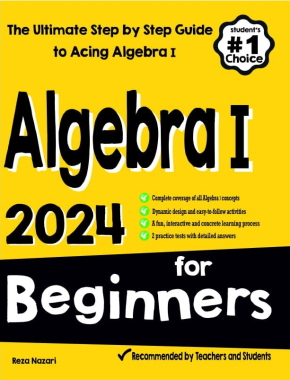

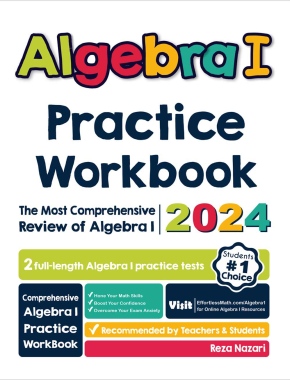
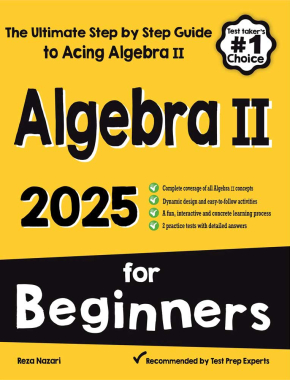
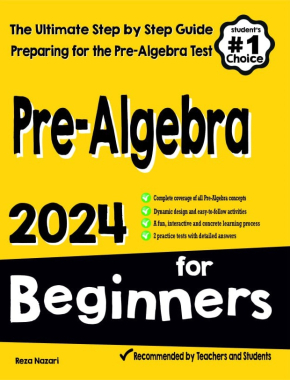
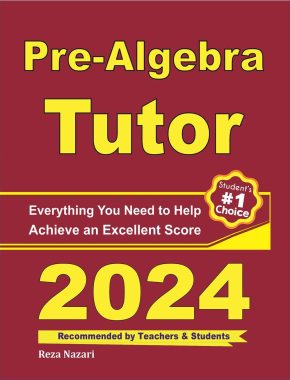
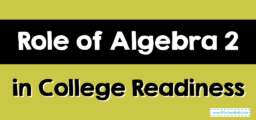

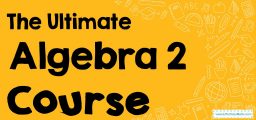
What people say about "What Topics Are Covered in Algebra 1? - Effortless Math: We Help Students Learn to LOVE Mathematics"?
No one replied yet.